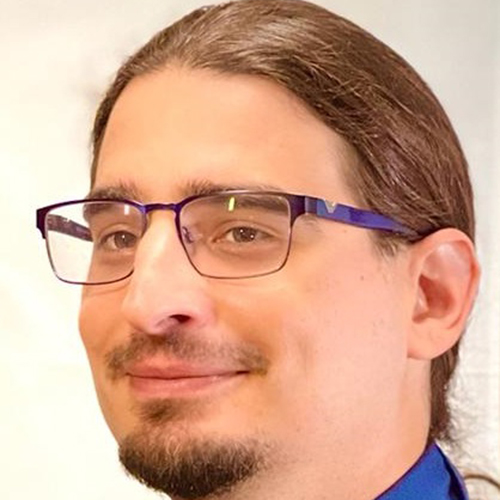Manolis Zampetakis: Seeking a Deeper Understanding of Machine Learning Methods
The School of Engineering & Applied Science is proud to welcome its newest faculty members for the 2022-23 academic year. The large influx of faculty members – 13 so far, with more to be announced soon – marks the rapid growth of the School and investment in the research areas illustrated in the SEAS Strategic Vision.
The latest faculty arrivals are valuable additions to the chemical and environmental, computer science, and electrical engineering departments. Their expertise includes sustainability, artificial intelligence, robotics, quantum computing, cybersecurity, and optoelectronic materials.
Upon their arrival, we asked these new faculty members questions about their work, their motivations, potential collaborations, and much more:

Manolis Zampetakis, Computer Science
Hometown:
I was very fortunate to grow up in a wonderful neighborhood of Athens, Greece called Pagkrati. I lived there during my childhood and undergraduate studies, and then moved to the U.S. for my graduate studies.
Prior academic history:
I completed my undergraduate studies at the School of Electrical and Computer Engineering of the National Technical University of Athens, where I worked with Prof. Dimitris Fotakis. I then moved to MIT where I completed my graduate and Ph.D. studies under the supervision of Prof. Constantinos Daskalakis. For the last two years, I have been a postdoctoral researcher at UC Berkeley in the group of Prof. Michael Jordan.
How would you summarize your research?
My research focuses on the foundations of machine learning (ML), statistics, and data science, including statistical analysis from biased data, e.g., conducting statistical estimation from truncated or censored data, optimization methods for multi-agent environments, and convergence properties of popular heuristic methods such as the EM algorithm and the Random Forests algorithm. I am interested in providing novel algorithms and their theoretical analysis as well as proving fundamental lower bounds that increase our understanding about these problems.
What inspired you to choose this field of study?
The remarkable success of many ML methods has led to an increasing effort to apply ML in many critical aspects of our society. When developing these applications though many novel challenges appear that classical ML techniques are not able to handle. The reason is that in order to operate properly, modern ML methods commonly postulate many strong assumptions such as: (1) access to data that adequately captures the application environment, (2) that the goal of the ML system can be expressed as an optimization of a single objective function. Both assumptions severely constrain the potential social value of ML systems. A main inspiration for my research is to understand the opportunities and limitations arising for ML when these assumptions are dropped. My goal is to provide theoretical understanding of these issues and reveal connections with theoretical computer science. I believe that theoretical understanding of ML methods is a significant component of building systems with formal guarantees with respect to their optimality, fairness, and robustness.
Where do you see the field 10 years from now?
In recent years, there is rapid growth in the number of people that work in the challenges that I mentioned above. This creates an amazing opportunity that I believe will be crucial in expanding the societal applications of ML. In the next 10 years I believe that we will be much closer to robust and fair ML systems with provable guarantees, and I hope that the department of Computer Science department at Yale will be at the front line of these advances.
What brought you to Yale?
Yale is without question one of the best schools in the US in virtually all disciplines. Additionally, the Computer Science department at Yale has been rapidly growing the last few years and this creates a fascinating environment for research and collaboration. I am looking forward to creating a research group with aspiring students and researchers to work on foundations of machine learning, theoretical computer science and their connections with economics.
What areas outside of Computer Science do you seek to create impactful research collaborations or partnerships?
Outside Computer Science my work can be beneficial to Statistics, Mathematics, and Economics whereas recently we have been working on applications in other disciplines such as Physics, Biology, Medical Studies, and Social Sciences. Yale is an exceptional environment for collaborating with world leaders in all these disciplines. I am really looking forward to joining this unique community of researchers!
Are there any courses that you look forward to teaching/creating?
I am always fascinated to teach courses and supervise students both in undergraduate and graduate level in many topics of Computer Science. At Yale there are a lot of classes that I would love to teach and are related to the following topics: Algorithms, Optimization, Data Analysis and Machine Learning, Game Theory and Strategic Behavior. I am also looking forward to developing classes on Robust Statistical Analysis, and Multi-Agent and Multi-Objective Optimization. Both classes will include recent developments on these topics. These ideas and techniques are crucial when designing real-world Data Science and Machine Learning systems.
What are your interests outside of the lab?
Outside research and teaching I love hiking and travelling to new places as well as baking and playing Greek traditional instruments.
What is the best New Haven Pizza?
I have heard that people are divided between what is the best pizza in New Haven, but virtually everyone agrees that in New Haven you can find the best pizza in the US. I personally did not have the chance to taste any pizza place in New Haven yet, but I am looking forward to it!

